1. How do new genres influence your songs?
2. What is a good song?
3. How important are gear and technique?
4. Do your lyrics carry a message?
5. How important is your presentation in the internet?
6. How important are live acts?
7. What is "authenticity" in music?
8. Do you want to become "rockstars"?
9. What is success for you?
And here we go ...
enroe: Of course we integrate elements and fragments of other genres than only rock music. But yes, our songs are rooted in the rock area, and any new and strange element must fit into a song. I like Madonna's album "Frozen" because she did a perfect syntheses of hip-hop and her typical Madonna style. We work with drumloops, synth-elements, filtersweeps and jungle snares - and we combine these with our rock guitar arrangements.
Q: How are your current songs of 2021?
e: Haha, today we're doing what we feel today. I mean we just do what an artist does: He creates something which comes from "deep inside" - and before he did the real creation he can't say how it will be. The same with us: We create songs, but we can't say how they will be beforehand.
Q: So we - the listeners - have to visit your concerts and your website?
e: Yeah that's it. We'll put new songs on our website first - and sure there'll be many surprises.
Q: What is the characteristic of a "good song"?
e: Haha, always that is the question! A "good song"?
Q: Well yes: What is a "good song"?
e: Ok, on the one hand a "good song" carries a relaxed and an easy feeling - a kind of slow-motion feeling - and on the other hand a "good song" must have a powerful and moving groove. A "good song" has an outstanding melody or hookline. This melody can be singable, but it must be unpenetrant. It must be a melody which doesn't annoy after some listenings. But it must be a melody which carries "something magic".
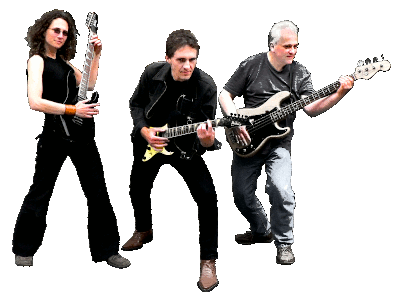
Q: These are the criteria?
e: If any description is valid at all, these are the criteria approximately. Of course the criteria are dependent on the feeling you want to create with a song. They are dependent on what the song shall be about. But finally the decisive question is: "Does the song groove and touch you?"
Q: Are all enroe songs "good"?
e:
Haha - what a question!
But yes, they are good!
For our taste all enroe songs are really good.
Of course our valuation is subjectiv, so everybody should value and decide
this question personally for himself.
Q: Can you plan the writing of a "good song"?
e: Perhaps very indirectly, but you hardly can plan to write a certain single song. Mostly a good song is a lucky hit by chance. In spite of all experiences and all tools and routine in arrangement skills: The idea, the melody or the hookline is created in a somewhat magic moment. And if this "magic deep moment" has happened to you or has not, that will be stated when listening to the takes of the session after a certain time distance afterwords.
Q: How do you create a song?
e: That is very different: The first input, the first basic idea often comes from live sessions, from a guitar riff, from a piano- or synthie-theme. Further parts like rhythm and vocals were added in the way you try to complete a puzzle. And at every step we decide wether this "adding" is good and will stay in the song. Or if this "adding" will be deleted. Sometimes a song is created in two hours only - and sometimes it takes weeks or even months.
Q: What influence does the equipment have on the song creation?
e: We think that the equipment - that means instruments and technique - should not have any influence. When we achieved a certain level in our studio and thus could create every imaginable sound the influence of the equipment decreased dramatically. There were no constraints any more - and today everything and every sound is possible. So now the ideas come into live only in our head - without any physical borders.
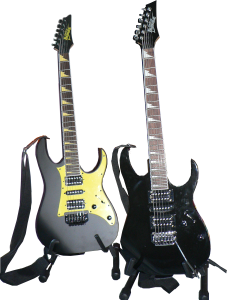
Q: So the equipment has no influence at all on song creation?
e: At least it has relatively low influence. But of course, still all ideas and uncomplete fragments of songs are stored on harddisc. And the way they are realized - with instruments and synths - has influence on their further use. But this influence ist much lower than it was once. In the earlier times the sounds came from fm-syhtesizers, from analogue- and other modules, from guitar-amps. This all was hardware - and so the borders of the possible sounds were very narrow. The software based instruments of today provide a much wider and nearly infinite range of sounds and sound manipulations.
Q: Is your mix automated? Or is it still done on analogue consoles?
e: We mixed every song digitally since the 90ties. We then controlled the console by midi-automation. Today it is even simpler: The technique of "total recall" means that the possibilities of song development are much wider. For instance today we can work on different songs alternating - without loosing any mix-setting.
Q: It strikes me that the vocals in your songs sounds in certain way high and somewhat "tight". How do you do that?
e: Yes, our underlying concept is to have easy and strongly compressed vocals. And it's quite difficult to sing such parts. But this way it's easier for us to imbed the vocals in the instrument-sound of a song, so that the overall feeling gets this "floating" and "dreamy" character.
Q: A "floating" character?
e: Exactly. Unfortunately we seldom achieve this in the way we wanted it.
Q: It strikes me that your songs increase incredibly if played over a good speakers. What's the reason for this phenomenon?
e: This due to the caprice that we tune a song for hifi-speakers. After a coarse mix the fine mix for hifi-listeners follows. That means e-guitars are distributed over the stereo-panorama, the e-bass is tight and strict, the snare is transparent but not annoying. So there's much eq-ing, listening and optimizing. At the last step - in the mastering stage - we try do compress very cautiously.
Q: How do you create your guitar sound?
e: That is very different: Mostly we take a micro and place it before the physical guitar amp. For guitar solos this is the best choice. After that we work on the usual effects: Compressor, delay, reverb, chorus and so on. But of course many guitar sounds are multisamples on the harddisc. We play these via keyboard and pitch-bend wheel.
Q: Do your songtexts carry a message?
e: That again is a question which cannot be answered, so ...
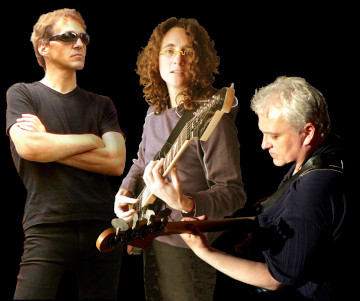
Q: But this question is important for many people. Really try to give an answer: Is there any message?
e: Haha, well yes, the attempt says: Yes and no! In all songs a concrete statement on anything is not intended. There are feelings and situations ... the topics have a range from every-day situations up to absurd things - from tragic moments up to erotic and melancholic moods - over time, decistions, fates, ancestors ...
Q: In the song "Mr. Careful" the light is shed on the contrast between a reserved and calm man and a dashing brisk type of man?
e: Yes, it's about Mr. Careful and Dr. Getfar. And it's about their success in society and job. Often it is the loud and peppy running type who is seen and who is heard. The one who carefully works in the backgrund is overseen and not noticed. Often he is underrated and more than that: He often is the candidate for becoming a scapegoat.
Q: Are these your own experiences?
e: Certainly! But there are also experiences of friends and people around us. In the case of "Mr. Careful" they are experiences in the my former job as IT-Manager and in situations and discrepancies that struck my sense of justice.
Q: How did you create the content of "father mcfairy"?
e: "father mcfairy" leads the attention to the past generations and the past centuries. Our consciousness about time and the myths of our fates are focused in this song.
Q: "extremely crazy" and "maybe" move the freedom of the individual on the stage?
e: Oops, they're very old songs! But yes, both have in common that they are centered on individuality. Both are about searching for identity and about the way someone defines himself. Both deal with the wish to be authentic and really cool.
e:
Yes indeed: We've been present on all important internet platforms since february 2001. These
were "mp3.de", "Ilike", "Callasong", "Soundlift", "Peoplesound", "Myspace" and many more.
Only a few of these sill do exist. Today, in 2017, Youtube and
Spotify are the current important media.
Today we concentrate our presence on our own website "enroe.de".
Q: What is so special about "enroe.de"?
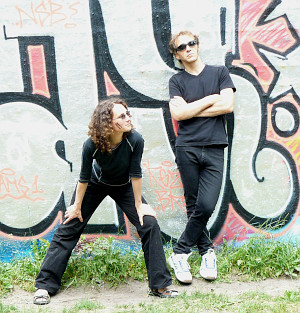
e: Many infos about us, pictures, scenes, thoughts and many songs are on our web residence. And the visitor can experience a visual scenery for almost every presented song.
Q: Yes, for every single song I've seen a big picture. And for some songs I realized even a whole image-sequence with various effects. And sometimes it is weird and very surprising. Where did the idea of these wild animations arise from?
e: At the beginning we wanted to sketch a video for every song. So we wanted to show the concept for a later video. This intention made itself independent and evolved into its own dynamic. Thus we developed complex animations for some songs, for instance for "pater monard" or "one chance".
Q: Is the offering of songs on the website the great way to promote the band?
e: Yes, it is!
Q: How is the resonance and response of the typical surfer? Are MP3s loaded down?
e: Well yes, all songs which are free are loaded down eagerly and avidly. The traffic is intense and it often borders the bandwith, and thus we have to contact our hoster permanently.
Q: And do you sell CDs?
e: In former times we sold a lot, but today the quantity is sparce, around 5 CDs in a month. Maybe the CD-format has died meanwhile.
Q: Or it is interesting for keen enthusiasts only?
e: Yeah, just like there are vinyl-enthusiasts there will be CD-fans left.
Q: How important is it for you to play on the stage - in front of an audience?
e: It is important and it's always a direct experience!
Q: How often do you perform live on stage?
e: In former times we all did - under different band names - extended live-events, nearly one gig per week. These live-things have a certain charme, because you can see the reaction of the audience directly and you can react on them. You can try new things and check reactions, you can play and shock and whatever. Today as "enroe" we only play some gigs per year.
Q: Why did it become more seldom? On the news-site I had to search quite a little.
e:
Yes, you can't always go fullspeed!
During the time there's a routine: travelling, building up the equipment, doing the soundcheck etc.
And with the time it becomes exhausting. After a time you realize that it robs power - and you
realize that you can't live this way for an infinite time. And also the live-phase is less
creative. In this phase only a few ideas rise up - and you feel less as a musician, but as
an actor and scenery-player.
Q: But these live-events incease you motivation enormously, do they?
e: Yes, of course! But as I said: You can't do this live-scenery-play for an infinite time. "Live" will always be adequate if we have new songs - and if the circumstances and the settings fit in.
Q: So if the circumstances and the setting "is right"?
e: Yes, then we do not only play our songs. We celebrate them! It's big fun to create a mythical morbide mood. Dependent on the song we play we create a stirring or melancholic scenery - a play with colours, mist, pictures, costumes ...
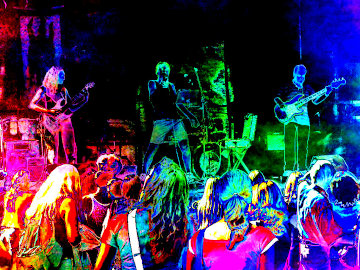
Q: That is how your stage show looks like?
e: Yes approximately, but it's not an adequate description - you've to experience it by yourself! And I should concede that we can't do that all in case of small gigs. For very small events we renounce mist, cololurs and costumes. All in all the songs must stand for themselves - without all the fuss around. Most important are always the songs and their sound.
Q: What does authenticity of rock music mean for you?
e: Authenticity lies in the fact that the one who plays and performs a song also composed and created this song - at least partially. That means that the composer himself carries the spirit, the atmosphere and the associations of the song.
Q: Examples?
e:
Oh, there are all the locals bands here in town. Among the famous musicians I'd mention Sting. He composed
all songs he sang. And he performs them without bombast or great lightshow. He puts his weight on the music only!
Or look at Phil Collins. He sings - most times - exactly those songs which he did compose. And many more: Randy
Newman, Deep Purple, ACDC, Mike Rutherford, SAGA, REAM, Foo Fighters. Simply all typical bands are authentic.
All those who compose their songs themselves, who play what they created and who can identify with their works
in their innermost depth.
Q: Anti examples?
e:
There are many acts in our mind. All the casted and artificial constellations like DSDS or the No Angels.
They are compounded by a marketing department - and yes, they are able to dance pretty good, have nice
voices and look rather good.
We wouldn't see these compounded groups as "creative musicians". They did not compose any single
song of their repertoire. More than that they even didn't select these songs themselves. Instead the business
manager, the marketing director and the repertoire-chief selected the songs they had to perform. Considering this
selection process there's the question of relationship: What relationship do these performers have
to the songs they bring up to the auditorium? For me this is the manifest of unauthenticity, of plastic-pop, of
a monomatic tunnel-view on the overcommercial charts.
But...
Q: But?
e: Yes: But - also the "unauthentic" constellations have good songs: Mostly it is the unknown composer who is really good. He (or she) works silently in the background, but he is the one who created the song and the feeling of a song. And yes - the performance of "that" constellation is pretty fine. In their own way they do it very well!
Q: What about Milli-Vanilli and Frank Farian?
e: They did not sing the songs - but everybody knew that Frank Farian created the songs. So Milli Vanilli presented the songs of Frank Farian. Frank just chose "special performers" for his songs, maybe he didn't want to be on the stage himself.
Q: Do you want to become "famous rockstars"?
e:
Aren't we famous rockstars? Ha ha ha!!
Every morning we spend two hours before the mirror and perform a wild guitar hook
while shaking our weird manes.
But seriously: What does this attribute "rockstar" mean?
If it means to look up at someone, to admire someone, to see someone as an idol or a model
then I think that everybody should be a star for himself. Because everyone is
unique and a genius!
If it means to build up an image for the public and to always carry this kind of image
then I think that this is not sooo worthwhile. The attribute "rockstar" can be necessary
for selling CDs. It can be connected with commercial success.

Q: But can it just mean to become "known" to the people?
e:
Yes yes, but that is just the same: Not you yourself become known
to the people! Not everybody does really "know" you. Instead it is the image of your
promotion-actions which becomes known to everyone. This image is transported by CDs and press,
and this special image becomes known.
And yes, every success is interfered with the spreading of this special image.
And if you are conscious about this mechanism you can have fun though.
You can create songs and "live" your creativity and spirit -
in spite of a probably "plastic artificial image" in the public.
Q: You can "live your spirit"?
e: Yes, exactly. It's difficult to describe: Songwriting is much more than just doing a certain "job". It is a feeling you have in your life. It is a mysterious easy and lifted or melancholic mood, it is a kind of enchantment, a natural spirituality. It is a dimension beyond the practical every-day world.
Q: What does "success" mean for you?
e: Mmmh ... yes ... it means just that, what we said already.
Q: So it is "enchantment" and "spirituality"? How do you achieve it?
e: Ha ok - we come to it by playing riffs on the guitar, by playing weird sounds on the keyboard, by playing things naively, by trying new sounds and by singing. If from these tryings there evolves an arrangement or a complete composition, a song which is still appreciated after some month and which moves us, which carries the "magic touch", then this happening is an incredible great thing! Then this is "the success"!

Q:
So it seems to me that this "success" doesn't mean "commercial success"
and the selling of CDs?
e: Closely looked at: yes! Creativity and commerce are related to each other in a peculiar tension. That is because permanently thinking about charts and about "selling numbers" diminishes the flow. But this flow is the presupposition for creativity. So creativity and commerce are like fire and water.
Q: Can someone buy CDs from you?
e: Yes, that's possible. We're delighted if someone orders CDs or MP3s from us or on our platforms. And we're also delighted if an A&R shows his interest for us.
Q: Are you dependent on selling CDs and MP3s?
e: As I said: We like to sell CDs and MP3s. But we needn't to do it.
Q: Is that valid for all band members?
e: Predominantly yes. The band members of enroe are either free-lancers in non-music areas or they deal exclusively with music. We compose and create songs together, and the so called "big commercial success" is not the main topic. If it comes it will be a nice appreciation. But if not it's alright too.
Q: Wouldn't it be quite a good way to found an independent label?
e:
Yes perhaps. Though this would be a side job.
And we would have to spend time for it - time which would
be missing in other areas.
Secondly we do believe that engagements in music business confines the independence and unprejudiced
creativity. If we would deal with market aspects day by day we couldn't concentrate on songwriting in
a blithely and carefree way.
Q: O.k, many thanks, that's it so far.
Interview by Eckbert Suhrbier.